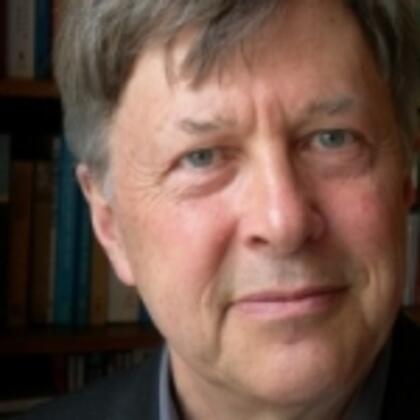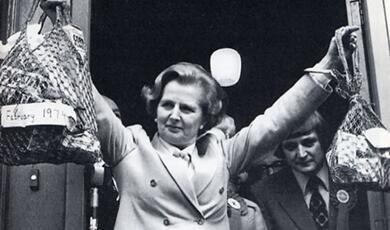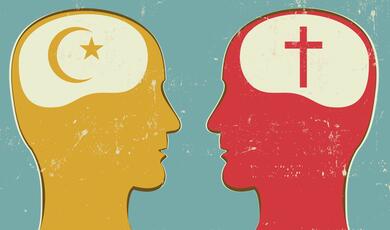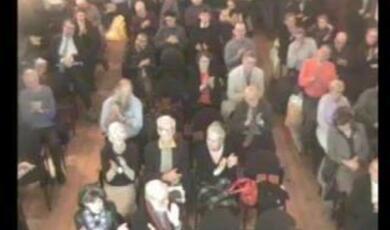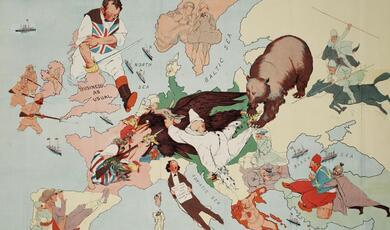Caps of Liberty: The Oddity of Democracy
Share
- Details
- Transcript
- Audio
- Downloads
- Extra Reading
The oddity of democracy is that government by the people means that the same group who are the rulers are, at the same time, subjects. There is a continuing tension between democracy as workers' control, and democracy as consumer sovereignty.
Download Transcript
6 February 2007
Caps of liberty: The oddity of democracy
Professor Rodney Barker
The oddity of democracy is that government by the people means that the same group who are at one time the rulers are, at the same time, subjects. There is a continuing tension between democracy as worker’s control, and democracy as consumer sovereignty.
* 1 PICTURE Louis XVI wearing the cap of liberty.
The picture illustrates the oddities of democracy:
1. Democracy is government by the people:
It may not always be clearly stated, but in the USA when the state prosecutes, the words say ‘the people versus X’, just as the Roman state’s description of itself was ‘populusque senatus Romanus’, the Roman people and senate.
But for there to be government, there has to be someone to be governed. Even ‘self-government’ by an individual depends on there being a divided self, the rebellious id and the controlling super-ego. In Athens that was no problem, since ‘the people’ referred to a minority of the population, adult males, so that the female half of the free population, plus slaves, were available for ‘the people’ to govern. But when the people is everyone, or at least all adults, in order for there to be government, the people have at one and the same time to be rulers and ruled, like those plays in which one actor plays many parts.
This is just what Louis XVI is, wearing the cap of liberty he is a citizen, wearing everything else he is the king: the king as subject, the subject as king. The ruler as different, the ruler as just like everyone else.
2. And all of this is conveyed, not by a constitutional document or a treatise on law or a political manifesto, but by actions and appearances, and by clothing.
The defining messages about public life can often be conveyed by much more than simple words. The importance of how you look, the sight, the sound, the movements compose the public person.
So there are two themes:
The paradoxes of democracy
The communication and creation of democracy in actions and appearances
3. The tensions inherent in democracy
The paradox, of people who are both rulers and ruled, is the root of a series of oddities and tensions within all democracies, tensions which characterise democracy, and which can never be solved. But that is not necessarily a bad thing. Clockwork depends on tension to tell us the time and as anyone who has ever tried to fly a kite will know, release the tension and the kite stops flying.
4. Democracy (& mobilised societies) versus the rest
Winston Churchill remarked that democracy was the worst form of government, apart from all the others. That is a well-established distinction. But there is another one, not a rival, but one which adds a further dimension, between mobilised and non-mobilised societies.
The first feature of the modern world is not that people become democratic citizens, but that they become a direct concern of government, which deals directly with them, and sees them as the foundation of both the resources and the identity of the state.
Modern societies are mobilised societies. We frequently distinguish between citizens and subjects. But even subject-hood is a status not universally found. In many societies, the inhabitants may not be in any real sense even subjects, but just human resources, on a level with all the other resources, animal, vegetable and mineral at a government’s disposal. Pre-modern governments did not mobilise the inhabitants of the territories they ruled. They either made occasional raids on them for taxes or foot-soldiers and/or left the ruling to others, whom they ruled (feudalism). So usually even the taxes and the foot soldiers were garnered indirectly.
Mobilised societies, by contrast, began by putting their armies into uniform. If they were mobilised autocracies, they moved on to putting everyone else in uniform as well. And it is at this point that the difference between democracy and all other versions of modern mobilised society begin to stand out.
5. Mobilised society and democracy:
The predictable and the unpredictable,
The ruled and the actively participating and, because actively participating, doing so in ways determined by themselves, not by government.
* 2, 3 PICTURES: Rockwell’s town meeting and Triumph of the Will
This illustrates the many ways in which political identities can be cultivated and expressed.
It also illustrates that you don’t necessarily need to look at both ordinary people and the formal machinery of government: in mobilised societies the one will tell you a lot about the other
6. Reading off the rulers from the people & vice-versa
One way of telling the difference between democracies and societies where the people are simply mobilised is provided by Bernard Miles in the 1948 Boulting brothers film, The Guinea Pig.: a polity is all of a piece, and one can tell a great deal about the character of the whole from that of a part, and of one part from the character of another.
It is possible to do this because to say that a society is mobilised is to identify a feature which is not conveyed at all by titles such as ‘oligarchy’, ‘despotism’, ‘dictatorship’ or ‘theocracy’. All these other words describe who it is that rules. It is possible to give an account of any one of them without giving an account of ordinary people, the inhabitants of the land. Nothing follows, from the nature of these systems of government, about the character of subjects, which can vary widely. If, on the other hand, they can be described also as mobilised, then the nature of rule and the nature of the ruled are inextricably engaged with one another.
In that sense there is as much difference between a mobilised theocracy and a pre-modern theocracy, as between a theocracy and a military dictatorship.
It may not be possible always to tell from studying ordinary people whether they live in a theocracy or a military dictatorship. But if they are in mobilised states, there will be much to be learned about the character of their government from the lives of ordinary men and women.
And democracy is distinct again, since while all the other forms of government can exist in either mobilised or un-mobilised societies, democracy is by its very nature, mobilised.
How democracy differs from other kinds of mobilised societies
Mobilised societies which are not democracies will share that regimented character which was the basis of the observations in The Guinea Pig. English boarding schools, whatever their other virtues, may be mobilised societies but are certainly not democracies.
Democracies will have no such uniform character
Democracy is characterised by two uncertainties or tensions:
i. Unpredictability
ii Rulers and ruled (equality and distinction)(government by the people and government for the people) (citizens and consumers)
Each of these is expressed not just in narrowly or conventionally ‘political’ activity, but in the whole range of actions which characterise public or social identity
Unpredictability
That requires an absence of uniformity with a presence of accepted and practiced rules and restraints. And the boundaries between the two are always and necessarily fluid. Is a law against blasphemy an imposition of religious uniformity, or the acceptance of rules of public discussion? There is no universal and simple answer. It depends on what you mean by blasphemy, for a start. Is a ban on the wearing of distinctive religious clothing by pupils in schools an assertion of the fact that all citizens are equal and that there are no special distinctions or social credit points, or is it an interference with the right of every citizen to dress as she pleases? The uncertainty of the answer, and the absence of a single, authoritative, imposed, and universal orthodoxy is what makes for the constant uncertainty of a democratic society, but is also the mark of its necessary freedom.
Rulers and ruled: Theatres versus Quaker meetings and jazz bands
In democratic states there is likely to be a confusion between equality which all people share as rulers, and distinction which exists between the same people as ordinary subjects of the state, and the specialised groups who carry out the day to day business of government.
There is a continuing tension between democracy as government by the people, which mean that the people rule, and democracy as government for the people, consumer sovereignty, which means that the people are the customers, but not the shopkeepers.
For the first, there needs to be equality, for the second, distinction between providers and provided. The second distinction is illustrated theoretically by Schumpeter, and graphically by Shaw.
Democracy as rule by the people, and not simply rule for the people, requires a democratic society
The word ‘democracy’ can be used too loosely to apply to anything from an election to a decision on what to have for breakfast. ‘socialism in one coffee bar’ . But it is difficult to have a society where in their political relations people are equal, but in their economic or social ones they are not. The deference of Lampedusa’s The Leopard: we will wait to see how the prince is going to vote before exercising our own democratic right to decide. Deference is different from respect.
Tawney’s freedom to tell people to go to Hell
Democracy as visible equality
Hoggart and Crosland on the changing character of the British. One mark of a democratic society may well be a democracy of appearance, dress, and the public presentation of persons. Citizenship has frequently been seen to be appropriately expressed not only by proprietorial behaviour, but by forms of dress, whether Mao jackets or liberty caps, which made citizens as distinguished, or as undistinguished as those who managed public things on their behalf.
Will Thorne’s ordinary working clothes and dinner with the Countess of Warwick. Tawney’s sergeant’s jacket.
Homespun in the American revolution, ‘conscious opposition to British corruption and luxury.' (Zakim, 1) and in US formal presence abroad
(at the court of Edward VII 1903),
though James Buchanan, American ambassador to London was in 1854 unable to attend the state opening of Parliament because he declined, in line with American practice, to wear ceremonial dress. (213-4). He wrote home to the Secretary of State that 'A minister of the United States/ should ...wear something more in character with our democratic institutions than a coat covered with embroidery and gold lace'.(Zakim 213-4)
*4 PICTURE
It is an ancient and venerable tradition: take no heed for what you shall eat or what you shall wear, consider the lilies of the field. Monasticism and Puritanism alike attempt to reduce clothing to a functional level, but cannot avoid at the same time using it to proclaim an egalitarian and ascetic message.
Democracy as the rule of all entails the abolition of visible distinctions: Mirabeau, at the start of the meeting of the Estates General in France in 1789, objected to the enforced distinctions of dress between the three estates. Yet it was not long into a revolution which set out to abolish equality, that new distinctions were being insisted on, created, and introduced
Equality could go, in the eyes of some, too far, and Abbé Grégoire in a report to the National Convention commented that under the Terror and the influence of the sans-culottes, people had demoted both proper dress and 'almost cleanliness and decency to the rank of counter-revolutionary crimes'.(Wrigley 81)
It was not long before the revolution was planning ways of acceptable distinction, between officials and ordinary citizens, between national representatives and mere articulate adults. By 1798 deputies had a coat of national blue, a tricolour belt, a scarlet cloak and a velvet hat with a tricolour cockade (Hunt, 79-80)
So there is a double tension in the dress of democracy
Whilst rulers or leaders may wish to establish distinctions between citizens and officials, there is a contrary belief that all people should be, and should appear to be, equal. Hence eccentric, flamboyant, unsettling action, appearance, behaviour, is stigmatised.
Citizens and rulers in democracies and non-democracies
Active citizens will not be indifferent to the identity of their leaders and, without entering the discussion about identity and legitimation, it can be suggested that in a democracy, and in a particular manner, the expressed identity of rulers and leaders is crucial, since citizens, whether they see rulers as leaders or as instruments, will expect to see in that identity, a fuller expression of their own.
The logic of liberal representative democracy is that its leaders be super ordinary, though Ian Buruma has suggested that the limitations this can place on ambitious self-presenters causes democratic leaders to strut on the world stage because they cannot strut at home. 1
Di Palma’s theory of virtuous legitimation 2, for instance, allows a distinction between despotisms and democracies, in terms of ‘virtuous’ legitimation. But this occurs in all systems. What distinguishes democracy is the particular tensions to which it gives rise there
The rulers of the rulers: Democratic leadership and its presentation
A monarch or a theocrat has no constraints in publicly proclaiming his superiority, special insight into divine law, high breeding, or outstanding qualities of insight and leadership. Democratic leaders must in one sense believe themselves to be superior, but in a system which even formally and occasionally is described as government by the people, there are strong constraints to describe themselves as a pretty ordinary guy or gal. There are striking instances of this in, for instance, the modification of monarchies – far from being their transformation or abolition, but adaptation to democratic expectations – in nations from the United Kingdom to Japan. 3
Leaders of the people
The permanent tension within democracy means that the people are the players, and therefore expect those who happen to be full time players to be like them, whilst at the same they expect them to be exceptional versions of themselves, themselves as they might be, themselves transformed and elevated, yet still in touch with their roots. It is always an impossible paradox.
So George W Bush descended from the skies onto the carrier USS Abraham Lincoln in May 2003 dressed as an ordinary pilot. Fortunately for all concerned, a real ordinary pilot was actually at the controls.
* 5, 6 PICTURE of Bush on the carrier, and Churchill on the invasion fleet?
When Marie Antoinette dressed as a peasant at the Petite Trianon, it was for the entertainment of herself and her courtiers. When democratic leaders do it, it is to entertain us.
So democratic leaders are expected to be like the people and of the people, but not too much. We, the shirtless, Peron’s shirt sleeves, Bush the ordinary pilot in a combat jacket, Tony Blair the pretty straightforward kind of guy. But….. Michael Foot’s jacket at the Cenotaph in. The academic deference joke: ‘not John, just Dr’
Democracy is in perpetual tension, which can never be resolved. And it is the nature of democracy, as an ideal system, not that these tensions are resolved or evaporated, but that they are dealt with, negotiated, discussed, and accepted as problems which are the entirely proper subject of disagreement, argument, and diverse proposed ways forward. Democracy is in that sense not a magical way of solving all the problems of public life, but a more honest and undogmatic way of recognising them and negotiating responses to them. It is not a way of finding the one right answer, but a recognition that there is no one right answer, but a great many tentative ones which will take us on to the next problem. The solutions will be pragmatic and almost certainly temporary, since at the level of absolute principle, the problems are irresolvable. This is no bad thing, since if all problems were resolved, what would there be left to do?
1 Ian Buruma, 'The Indiscreet Charm of Tyranny', New York Review of Books, (,52,8, May 12 2005) 35-7, p.372 Guiseppe Di Palma, 'Legitimation from the Top to Civil Society: Politico-Cultural Change in Eastern Europe', World Politics, (,44 1 October 1991 1991)
3 Kenneth J. Ruoff, The People's Emperor: Democracy and the Japanese Monarchy, 1945-1995, (Cambridge, Mass., Harvard University Press, 2001)
© Professor Rodney Barker, Gresham College, 5 February 2007
This event was on Tue, 06 Feb 2007
Support Gresham
Gresham College has offered an outstanding education to the public free of charge for over 400 years. Today, Gresham plays an important role in fostering a love of learning and a greater understanding of ourselves and the world around us. Your donation will help to widen our reach and to broaden our audience, allowing more people to benefit from a high-quality education from some of the brightest minds.


 Login
Login



